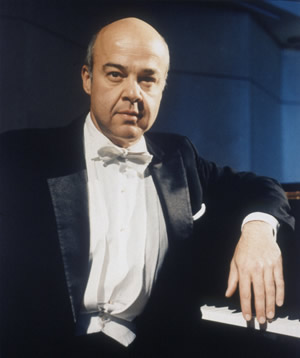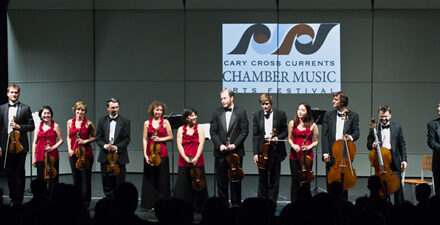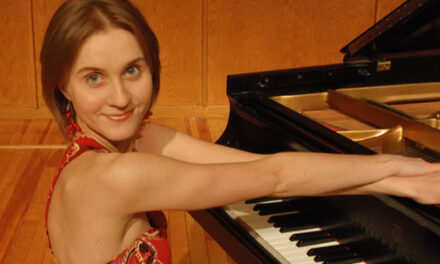The Eastern Music Festival, now in its 51st season, presented a concert of Russian music that for its performances and unusual repertoire will remain engraved in the memories of those lucky enough to have been attending. The program in Dana Auditorium opened with a miniature “lollipop,” a sweet confection named “Canzonetta” by Portland-based composer David Schiff featuring trumpet, originally written to honor Gerard Schwarz’s final season as Music Director at the Seattle Symphony – essentially a popular song drawing on Latin-music idioms, in orchestral dress, and not much more than forgettable, although pleasant enough.
This presumably gave latecomers time to get in the door for the major issue at hand, the Prokofiev Piano Concerto Op. 26/3. This is probably the most popular and most often heard of the six piano concertos by Prokofiev, and dates from 1921, the year the composer turned 30. The soloist, Alexander Toradze, was born in Tbilisi, and trained at the Tchaikovsky Conservatory in Moscow. His performance style incorporates a 20th-century Russian approach (steely pianism redolent of jack-hammers) with his own interpretive views, and the audible result, it is safe to say, left the audience amazed. The concerto opens in an unusual way – with almost folkish sounding, modal material for two clarinets, which leads through a chromatic rise to an almost cinematic opening-out for the strings – sounding Hollywoodian before the fact. And finally, allegro, the piano enters. Toradze’s tempo here was very fast, astoundingly fast, leading to material that conveyed an exceptional violence, completely under control. He combines an amazing technique with a musical approach that stands out for an almost willful peculiarity, something that fits perfectly with this composer and this work.
The second movement of the work is a set of variations on a theme, and here one might say the predominant affect was frightening, with Toradze displaying control of radical and rapid shifts of dynamics, from mp to fffff, almost instantaneously. The closing movement, not as directly brilliant as the opener, is quasi-fugato, and here Toradze managed to bring out inner voices that are rarely heard. After the final cadence, the standing audience gave an extended ovation bringing Toradze (seemingly shy, in spite of his extroverted and superhuman pianism) back for bow after bow. A truly remarkable performance.
After intermission, the program offered two more Russian works, both rarely heard. The first was the Glazunov Saxophone Concerto in E-flat, Op. 109, with soloist Ben Robinette. This is a work for which the conservative harmonic language and scoring belie its late date (1931) – it belongs thoroughly in the nineteenth century, and perhaps more importantly at the St. Petersburg Conservatory. The combination of the loud voice of the alto saxophone with an ensemble of strings only seems odd to modern ears, and there’s not quite enough memorable in the melodic writing to cause the piece to join the standard repertoire. Robinette, evidently a member of the corps of students at the festival, gave a fluent reading that demonstrated a mastery and control of the complete range of the instrument.
Closing the program, and reaching far back into the Russian nineteenth century (1868), Schwarz presented the Symphonic Suite Op.9/ 2 of the godfather of Russian modernism in the twentieth century, Nikolai Rimsky-Korsakov. Compared with the flash and bang of the Prokofiev, this dreamy imagining of the exotic east seemed tame, particularly the almost placid conclusion of the tale of the Arab poet whose life is depicted. Nevertheless, EMF deserves our thanks for sharing these two rarely-heard works with North Carolina audiences.













